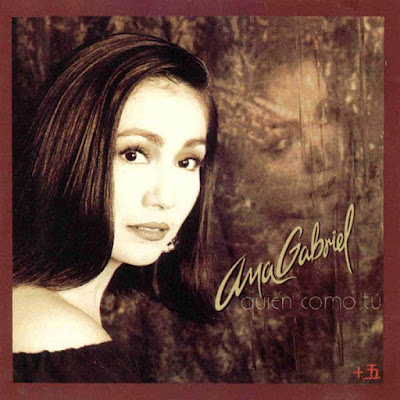2nd September, 1989
Well, this was unexpected.
Not the fact of Ana Gabriel's reappearance in this travelogue (I'd peeked ahead), or the fact that she was peddling another ballad — according to my
theory, September is prime ballad territory — but the song's subject matter.
In these posts I've usually started out by talking about the sound of the song, then worked my way into discussing the lyrics; since Spanish isn't my first language, that's often seemed like the most natural way to approach them. But there are times when the lyrics suggest so much, and are so startlingly different from what I in my ignorance would have expected, that they insist on being dealt with first. Here, then, are the lyrics to "Simplemente Amigos" in full (my translation); I'll meet you again below:
ONLY FRIENDS
Always, like usual, from day to day the same
There's nothing to say in front of people like this
Friends, only friends and nothing more
But who knows in reality what happens between the two
If each one when night falls feigns a goodbye
How much I would give to cry to them of our love
Tell them that when the door closes we love each other uncontrollably
That we wake up embracing, hungering to go on loving each other
But I know that in reality they won't accept our love
Always, with looks we always give each other all our love
We speak without speaking, everything is silent where we walk
Friends, only friends and nothing more
But who knows in reality, what happens between we two
If each of us when night falls feigns a goodbye
How much I would give to cry to them of our love
Tell them that when the door closes we love each other uncontrollably
That we wake up embracing, hungering to keep on loving each other
But I know that in reality they won't accept our love....
No, oh no, they won't accept our love
No, oh no, they won't accept our love....
I might as well confess that I'm generally unsympathetic to the pop convention whereby every love is threatened by an unspecified They. The origin of that convention, the girl-group songs of the sixties, grew out of a specific time and place, the class-conscious (which often went musically coded as race-conscious) bourgeoisie of the American Northeast, and had specific enemies in mind: parents, school boards, The Man. Even Madonna's "Papa Don't Preach" located the resisting force in a character; but more often since the 80s pop expresses a generalized truculence aimed at anyone who would in any way sideline or doubt the Intensity of What We're Feeling. Even with a song I love very much, like Alicia Keys' "No One," I'm always left with the nagging feeling that she's being overdramatic: you ain't no Capulet, girl, hush up and live your damn life. Exactly no one is stopping you.
But I do not feel that way about this song. The reason should be obvious: even though the song is scrupulously careful not to give away any identity tags about the "we," the psychology of the closet is too obvious to go unremarked. With the benefit of hindsight, she could hardly have been more blatant if she had sung "amigas simplemente amigas." (I, uh, don't have to explain gendered nouns, do I?)
Ana Gabriel has always stated that she sang it in solidarity with her gay fans, and I see no reason to doubt her; the internet is rife with speculation — and plenty of flat-out assertions — that she's gay, but she says she loves women as people, not as lovers. It hardly matters; her gay following is large and devoted, and she doesn't have to be a lesbian to be an outspoken
defender of gay rights in the Mexican media. (Her vocal style, it turns out, is only one of the things she has in common with Melissa Etheridge.)
From what I can tell, the song has long been understood as an anthem of gay identity in Latin Pop, even if people who wish to believe otherwise are able to do so; and Gabriel's assumption of it as one of her signature songs is something I did not expect to encounter so early in this travelogue. Clearly that has more to do with my own prejudices and assumptions — Latin audiences are more conservative, gay rights didn't really gather steam until the 90s in Latin culture, pop stars are normatively heterosexual — than with reality. (And the fact that the word "reality" is repeated twice, with opposite meanings, in the lyrics of "Simplemente Amigos" is no accident: in pop, reality depends a lot on who's looking.)
But I'm glad to acknowledge reality over my assumptions. Frankly, that undertow makes the song a lot better, far more intense and gripping than some half-hearted run through a memory of West Side Story.






